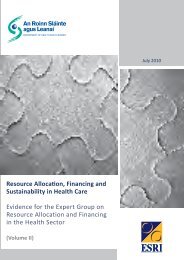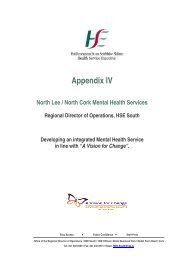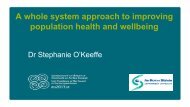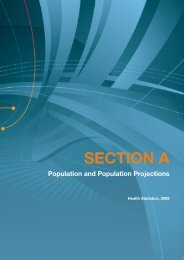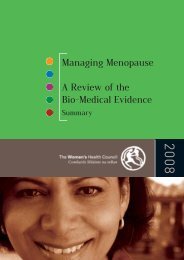Brennan Report - Department of Health and Children
Brennan Report - Department of Health and Children
Brennan Report - Department of Health and Children
Create successful ePaper yourself
Turn your PDF publications into a flip-book with our unique Google optimized e-Paper software.
Chapter 2 Overview <strong>and</strong> IssuesIn 2002, the estimated increase in expenditure on the GMS over 2001 was 13.3%. The actual increase inspend was 41.3% higher than the previous year – thus requiring a supplementary estimate <strong>of</strong> ¤ 183million. Each year since 1998 predictions about increases in spending have failed to anticipate how muchExchequer funding will be required. In 2003, the estimated increase in costs is 5.2%. We recognise thechallenge that this estimate poses for the Government in terms <strong>of</strong> its policy choices on the GMS. We dealwith these challenges in more detail in Chapter 6.Problem 2: Unapproved Capital ExpenditureEarly in 2002, the <strong>Department</strong> <strong>of</strong> <strong>Health</strong> <strong>and</strong> <strong>Children</strong> became aware that the capitalcontractual commitments <strong>of</strong> health boards included approximately ¤ 115 million not approvedby the <strong>Department</strong> <strong>of</strong> <strong>Health</strong> <strong>and</strong> <strong>Children</strong>. These related to a wide range <strong>of</strong> projects, some <strong>of</strong>which had partial or limited <strong>Department</strong> <strong>of</strong> <strong>Health</strong> <strong>and</strong> <strong>Children</strong> approval <strong>and</strong> others which hadno approval from the <strong>Department</strong>. It would appear that all <strong>of</strong> these unapproved contractualcommitments relate to appropriate health service projects in different care programmes. Itmust be emphasised that on larger construction projects where <strong>Department</strong> <strong>of</strong> <strong>Health</strong> <strong>and</strong><strong>Children</strong> pr<strong>of</strong>essional staff have had a direct involvement, budgetary difficulties have not arisen.Some health boards incorrectly took the view that the indicative funding which had beennotified at the commencement <strong>of</strong> the National Development Plan (NDP) for planningpurposes only could be regarded as a capital allocation <strong>and</strong> engaged in expenditure on capitalprojects without seeking approval from the <strong>Department</strong> <strong>of</strong> <strong>Health</strong> <strong>and</strong> <strong>Children</strong>.Also, circularsissued since the commencement <strong>of</strong> the NDP instructing health boards to comply with theestablished <strong>and</strong> normally rigorous procedures for the approval <strong>of</strong> individual projects were insome cases not adhered to (see Appendix 4).The unapproved commitments were generated in 2000/2001 at a time when health boards,supported by the <strong>Department</strong> <strong>of</strong> <strong>Health</strong> <strong>and</strong> <strong>Children</strong>, were striving to ensure theimplementation <strong>of</strong> the National Development Plan <strong>and</strong> were putting in place resources toproperly plan <strong>and</strong> to cost projects. <strong>Health</strong> boards were developing their NDP programmes inthe context <strong>of</strong> high local expectations <strong>and</strong> significant public pressure to meet the aspirationscreated by the launch <strong>of</strong> the NDP <strong>and</strong> the then buoyant economic climate.This was clearly adifficult developmental stage in the transition <strong>of</strong> the capital programme to a major multiannualinvestment plan. Before the NDP, the boards were relying on weak organisationalstructures <strong>and</strong> on older systems <strong>of</strong> planning, monitoring <strong>and</strong> control which had been in placefor many years to support a relatively modest annual capital programme.The management <strong>of</strong> the NDP programme within some boards, <strong>and</strong> the expectation associatedwith same, has certainly been problematic <strong>and</strong> has generated unapproved expenditure.This mustbe corrected <strong>and</strong> the NDP programme operated in line with requirements set down by the<strong>Department</strong> <strong>of</strong> <strong>Health</strong> <strong>and</strong> <strong>Children</strong>. We regard what occurred in relation to some healthboards in respect <strong>of</strong> unauthorised expenditure as unsatisfactory, particularly in the light <strong>of</strong> theclear instructions issued by the <strong>Department</strong> <strong>of</strong> <strong>Health</strong> <strong>and</strong> <strong>Children</strong> on the process <strong>of</strong> NDPmanagement at central <strong>and</strong> local level. We underst<strong>and</strong> that the Comptroller <strong>and</strong> AuditorGeneral is examining this issue.The <strong>Department</strong> <strong>of</strong> <strong>Health</strong> <strong>and</strong> <strong>Children</strong> has emphasised that no additional capital funding has33



